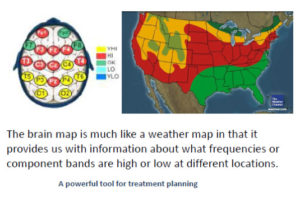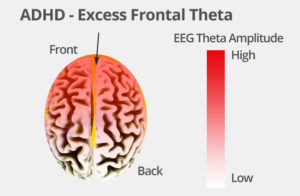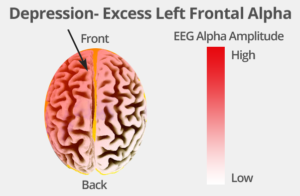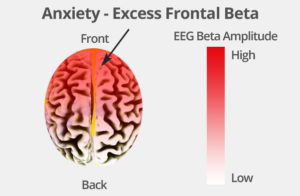How does Neurofeedback training in Cumming GA change your life?
It’s no secret! The brain influences and regulates every part of you and is the most powerful organ in the human body. Unhealthy patterns of brainwave activity can affect not only how well our brains perform but how we feel, how we respond to stress, our respond to illness and how quickly we “bounce back” from life’s stressful events. Exercising our brains using QEEG Neurofeedback helps to shape brainwave activity into healthier patterns. People find their symptoms decrease, their mood improves, and their ability to concentrate and sustain their focus as well as their attention improves. In short, when our brains function better, we function better.
If Cumming Neurofeedback is so successful, why haven’t I heard of it before?
Actually the EEG or Electroencephalography technology used in Neurofeedback was first introduced in the late 1800’s. Recent advancements in Neurofeedback Brain Mapping and Training technology has been showcased on The Oprah Winfrey Show, Dr. Phil, & 20/20. Time Magazine called Neurofeedback “the most effective solution for ADHD” by the journal Opinions in Pediatrics and most recently the journal “Child and Adolescent Psychiatric Clinics of North America” has devoted its entire issue to the use of Neurofeedback in psychiatric disorders affecting children and adolescents.
What Is Neurofeedback good For?
Neurofeedback has proven successful with a great variety of disorders. It has been used very successfully with Depression, Anxiety, ADHD, Fibromyalgia, OCD, Migraines, Seizure Disorder and has been very helpful with Bipolar Disorder, Stroke, and TBI. Neurofeedback has been used to enhance peak performance in Athletes. PGA golfers, Professional athletes, business executives and individuals who simply want to improve their lives and perform better have benefited from the use of Neurofeedback.
Still have questions?
Please contact us if you have questions or need information regarding our Brain Enhancement Programs. We are happy to speak with you and offer a free phone consultation and screening to answer any question you have and to see if one of our Brain Enhancement Programs is a good fit for you or someone you love.
Purchase Brain Tap Headset online here
qEEG Brain Map Services
As part of our neurofeedback programs qEEG Brain Maps are performed on all clients in order to assess for neurofeedback training protocols. This procedure involves placing a swimming cap type headset that has 19 electrodes embedded in the cap on the individuals head. Electrical activity is recorded from across the scalp and the data is used to generate topographic maps of electrical activity distribution across the brain. These maps are then correlated with a normative database to determine if individuals have any unusual electrical activity and locate its source in the brain. This information can then be used to determine optimal neurofeedback protocols. It can also be used to assess changes from neurofeedback training and evaluate progress. In addition the maps can be correlated with other maps to determine whether an individual is likely to have cognitive or emotional problems.
In 2013, the “Best Practices” website of the American Academy of Pediatrics endorsed Neurofeedback as a Level One Modality which places it in the same category as Medication, Counseling and Behavior Management Therapy.
How Can Cumming Neurofeedback Help With Attention Deficit Hyperactivity Disorder – ADHD?
Over 40 years of basic and applied research demonstrates the efficacy of Neurofeedback for ADHD. According to the Centers for Disease Control and Prevention, ADHD is the most frequently diagnosed pediatric behavioral health disorder in American school-aged children. ADHD is widely viewed as being associated with inattentiveness, difficulty organizing or completing tasks, impulsivity, restlessness, and hyperactivity.
Neurofeedback is uniquely suited to addressing the neuronal dysregulation typically seen in the Frontal Lobes of the Brain. The most common pattern is a slowing of brainwave activity which is opposite of what is desirable when attention and concentration is required. This generally means the area is under-activated and is using less glucose and oxygen than it should. Although we all have difficulty attending to things that don’t excite us, for children and youth with ADHD even more slowing occurs. This results in significant interference with attention, short term memory and emotional evaluation. Some individuals will fall asleep or enter into a daydreaming state in 90 seconds if forced to attend a boring stimulus. The agitation they experience when forced to attend in class or complete homework is physically painful for them. When they do pay attention, it is like trying to follow a story or conversation on television or an electronic devise and someone else is changing the channel or controlling the screen.
Adults diagnosed with ADHD also experience similar difficulties because they don’t absorb important information and frequently make errors, like forgetting important deadlines or requests. This can have a profound impact on interpersonal relationships, job performance and quality of life.
It is difficult for people of any age with ADHD to observe and understand why and where their problem is coming from. They frequently feel as though everyone is out to get them or that they are getting unfairly picked on or misunderstood. They often become hypervigilant, angry and defensive. At this point the picture becomes much more complex and symptoms of Anxiety and/or Depression need to be addressed as well. This is why having a qEEG Quantitative Brain Map done before starting Neurofeedback is critically important for personalizing the training and optimizing the outcome.
Relieving The Symptoms of Depression With Neurofeedback in Cumming
What psychologists refer to as depression is seen more as an end stage of anxiety by many Cumming GA neurofeedback therapists. The body can maintain high levels of central nervous system hyperarousal for only so long. Eventually the system begins to weaken and in response protects itself. Just as an arm that receives an injury may become stiff to naturally reduce its use and allow for healing, the brain slows down to protect itself from exhausting its resources on anxiety. Research at Keck Imaging Labs at the University of Wisconsin shows that depressed people experience a reduction of activity in the left side of the brain. This is the side that operates to get us engaging in positive moods and effective social interactions. When it slows down we naturally pull away from others and lose interest in things. We want to withdraw to our bed and just lay there. Everything seems flat and uninteresting. We lose the zest for life. Our moods become very negative. Energy is low. We either can’t sleep at all or we sleep too much. It is the way our biology protects itself when the stress and strain of life becomes overwhelming. So a short mild depression is not necessarily a bad thing or an abnormal thing for most people. But when it goes on for more than two weeks and begins to undermine our daily living, then it is a serious problem. For some it can even end in death.
Individuals who have been depressed for more than two weeks should seek help from a mental health professional right away, especially if any thought of suicide are involved. A psychotherapist will give you tests to diagnose the type of depression and refer you to a psychiatrist for medication. The medications will lift some of the depression and the psychotherapist can begin to work with you to re-organize your life in a way that it works for you.
There are many individuals, however, who would prefer not to use drugs to manage their depression. For these individuals neurofeedback offers an additional solution. Many training with neurofeedback experience significant relief within 15 sessions. This offers the possibility of reducing medication and in many cases eliminating the need for it all together.
In dealing with depression many neurofeedback therapists in Cumming place an electrode on the scalp over each side of the brain and train the individual to increase alpha brainwaves on the right side while reducing it on the left. As the left side of the brain becomes more active, individuals begin to feel more positive in their moods. The excess frontal alpha diminishes in magnitude over a period of training sessions and relief becomes continuous.
How Can Neurofeedback Help With Anxiety?
Individuals with anxiety have a chronically hyperaroused central nervous system. In a majority of cases disposition towards anxious behavior is genetic in origin. Any powerful trauma to the central nervous system or prolonged stress can result in chronic anxiety and/or panic attacks. Anxiety reduces immune system function, impairs working memory, creates attentional problems and generates a wide variety of physical symptoms that vary from person to person. As many as 60% of doctor visits may have their basis in the effects of prolonged anxiety. Individuals tend to block out the feelings of anxiety over time, but the physical stress it creates for the body continues to increase until physical problems develop. Most people are very surprised to discover that what they thought was purely a physical problem is primarily due to chronic anxiety. It is only in the last decade that the full impact that anxiety has on the human biology is coming to be appreciated.
Anxiety results in an overactive brain. Individuals tend to worry or ruminate excessively and are hypervigilent. This causes increased brain activity that is chronic and results in excessive consumption of oxygen, glucose, and neurotransmitters as well as a host of nutrients. The effect of this appears in PET scans as well as topographic EEG braimaps. The heightened level of metabolic activity also results in higher levels of fast brain wave activity known as beta brainwave activity. We call this condition “brain too fast” in contrast to depression in which the brain is running too slow.
With neurofeedback the goal is to train the brain to slow down and operate in a more optimal zone of functioning. As the brain practices being in this more efficient zone of operation it begins to grow networks that help it regulate itself better when it is not practicing in the clinic. Over time this new zone of operation becomes the default or normal zone of operation. The symptoms of anxiety progressively dissipate as the individual trains and the brain normalizes functions.




